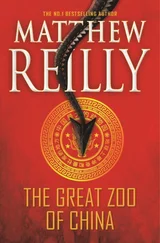Latissier had never expected it.
Schofield kept his grip on Latissier's weapon hand as he fell, and, hanging from it, he swung down onto the empty deck below. Like a cat, Schofield landed on his feet and immediately raised Latissier's crossbow up at the underside of the D-deck catwalk and pulled the trigger.
Latissier was lying facedown on the catwalk?with his arm stretched awkwardly out over the edge?when the crossbow discharged. At point-blank range, the arrow shot up through a gap in the steel grating, penetrated Latissier's night-vision goggles, and lodged itself right in the middle of the Frenchman's forehead.
Down in the drilling room, Rebound faced the crossbow-wielding French commando.
The Frenchman thought he had the upper hand, thought he had Rebound dead to rights. He only forgot one thing.
Night vision is hell on peripheral vision.
He was standing too close .
Which was why he never saw the Maghook that Rebound was holding at his hip.
Rebound fired. The Maghook shot out from its launcher and slammed into the Frenchman's chest from a range of three feet. There came a series of instantaneous cracks as the French commando's rib cage collapsed in on his heart. He was dead before he hit the ground.
Rebound took a deep breath, sighed with relief, looked at the drilling room in front of him.
He saw what the Frenchman had been doing and his mouth fell open. And then he remembered what the Frenchman had said earlier.
"Le piège est tendu."
Then Rebound looked at the room again.
And he smiled.
" South tunnel ," Montana's voice said over Schofield's helmet intercom.
Schofield was down on E-deck now, having swung down there on Latissier's arm. He looked across the pool and saw a black figure running into the south tunnel. It was the last French commando?save for the one who had rappelled down the shaft earlier.
"I see him," Schofield said, taking off in pursuit.
" Sir, this is Rebound ," Rebound's voice suddenly cut across the airwaves. " Did you just say the south tunnel ?"
"That's right."
" Let him come ," Rebound said firmly. " And follow him down ."
Schofield frowned. "What are you talking about, Rebound?"
" Just follow him, sir ." Rebound was whispering now. " He wants you to ."
Schofield paused for a moment.
Then he said, "Do you know something that I don't, Corporal?"
" That I do, sir ," came the reply.
Montana, Snake, and Gant joined Schofield on E-deck, at title entrance to the south tunnel. They'd all heard Rebound over their helmet intercoms.
Schofield looked at them as he spoke into his helmet mike. "All right, Rebound, it's your call."
Schofield, Montana, Snake, and Gant edged cautiously down the long southern tunnel of E-deck. At the end of the tunnel they saw a door, saw the silhouette of the last French soldier disappear behind it, a shadow in the green darkness.
Rebound was right. The soldier was moving slowly. It was almost as if he wanted them to see him go into the drilling room.
Schofield and the others pressed forward down the tunnel. They were about ten yards away from the door to the drilling room when suddenly a hand reached out from the shadows and grabbed Schofield by the shoulder. Schofield spun instantly and saw Rebound emerge from a cupboard set into the wall. There seemed to be another body in the cupboard behind Rebound. Rebound pressed bis finger against his lips and led Schofield and the others down the tunnel toward the drilling room door.
"It's a trap," Rebound mouthed as they reached the door.
Rebound pushed open the door. It creaked loudly as it swung open in front of them.
The door swung wide and the Marines saw the last Frenchman standing over on the far side of the drilling room.
It was Jean Petard. He looked forlornly at them. He was caught in a dead end, and he knew it. He was trapped.
"I . . . I surrender," he said meekly.
Schofield just stared at Petard. Then he turned to Rebound and the others, as if calling for advice.
Then he stepped forward into the drilling room.
Petard seemed to smile, relieved.
At that moment, Rebound suddenly stuck his arm out in front of Schofield's chest, stopping him. Rebound had never taken his eyes off the Frenchman.
Petard frowned.
Rebound stared at him and said, " Le piège est tendu ."
Petard cocked his head, surprised.
"The trap is set," Rebound said in English.
And then Petard suddenly averted his gaze and looked at something else, something on the floor in front of him, and his smile went flat. He looked up at Rebound, horrified.
Rebound knew what Petard had seen.
He had seen five French words, and as soon as he had seen them, Petard knew that his fight was over.
Those five words were: BRAQUEZ CE CÔTÉ SUR L'ENEMMI.
Rebound stepped forward and Petard yelled, "No!" but it was too late. Rebound stepped through the trip wire in front of the door, and the two concave mines in the drilling room exploded with all their terrifying force.
THIRD INCURSION
16 June 1130 hours
The highway stretched away into the desert.
A thin, unbroken strip of black overlaying the golden-brown floor of the New Mexico landscape. Not a single cloud appeared in the sky.
A lone car raced along the desert highway.
Pete Cameron drove, sweating in the heat. The air conditioner in his rented Toyota had long since given up the fight for life, and now the car was little more than an oven on wheels. It was probably ten degrees hotter inside the car than it was outside.
Cameron was a reporter for the Washington Post , had been for three years now. Before that, he had made a name for himself doing features for the respected investigative-reporting journal Mother Jones .
Cameron had fitted in well at Mother Jones . The journal has one all-encompassing goal: to expose misleading government reports. Cover-ups. And to a large extent, it had been successful in achieving this goal. Pete Cameron loved it, thrived on it. In his last year at Mother Jones , he had won an award for an article he had written on the loss of five nuclear warheads from a crashed B-2 stealth bomber. The bomber had crashed into the Atlantic Ocean just off the coast of Brazil and the U.S. Government had issued a press release saying that all five warheads had been recovered, safely and intact. Cameron had investigated the story, had queried the methods used to find the missing nukes.
The truth soon emerged. The rescue mission had not been about the recovery of the warheads at all. It had been about recovering all evidence of the bomber. The nuclear warheads had been a secondary priority, and they had never been found.
It was that article and the award ftiat followed it that had brought Cameron to the attention of the Washington Post . They offered him a job, and he took it with both hands.
Cameron was thirty years old and tall, really tall?six-feet-five. He had messy sandy-brown hair and wireframe glasses. His car looked like a bomb had hit it?empty Coke cans were strewn about the floor, intermingled with crumpled cheeseburger wrappers; pads and pens and scraps of paper stuck out from every compartment. A pad of Post-its rested in the ashtray. Those that had been used were stuck to the dashboard.
Cameron drove through the desert.
His cellular rang. It was his wife, Alison.
Pete and Alison Cameron were something of celebrities among the Washington press community, the famous?or infamous?husband-and-wife team of the Washington Post . When Pete Cameron had arrived at the Post from Mother Jones three years ago, he had been assigned to work with a young reporter named Alison Greenberg. The chemistry between them had ignited immediately. It was electric. In one week, they were in bed together. In twelve months, they were married.
Читать дальше











